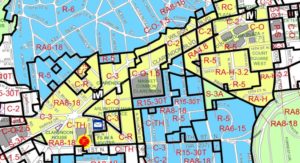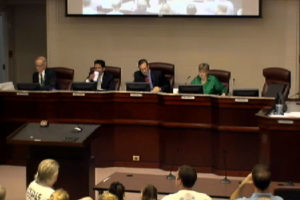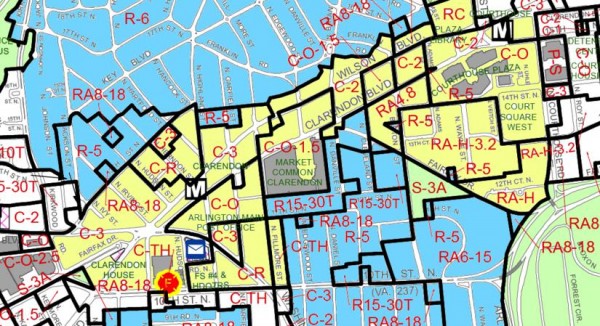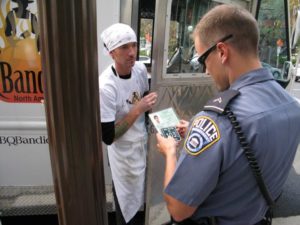 (Updated at 12:55 p.m.) Food trucks in Arlington would be allowed to remain in one spot for up to two hours, under an ordinance change set for County Board consideration this Saturday.
(Updated at 12:55 p.m.) Food trucks in Arlington would be allowed to remain in one spot for up to two hours, under an ordinance change set for County Board consideration this Saturday.
Under the current ordinance, known as Chapter 30, food trucks are only allowed to remain parked for up to one hour. After that, they must move — but the current ordinance is vague and doesn’t specifically say how far they must move. Also, the ordinance contains contradictory language that can be interpreted as suggesting there is no time limit.
Food truck owners argue that the 60 minute limit hurts their business, as it can force them to shut down and move in the midst of the breakfast or lunch rush, even when customers are lined up. Since the trucks frequent busy Rosslyn, Ballston and Crystal City, that often means spending valuable sales time searching for a new parking space.
Food truck owners, fed up with getting ticketed for loitering when they refused to move, recently started mounting legal challenges against the ordinance, attacking the vague language. Last month they succeeded in getting prosecutors to drop loitering charges against one truck that was ticketed after police said it didn’t move “far enough.”
At the time, county officials acknowledged that the ordinance caused challenges for food vendors.
“We realize that the 60-minute time limit is challenging for vendors and for customers, and we are working to change it,” Arlington County spokeswoman Mary Curtius told ARLnow.com.
True to that promise, county staff is now proposing that the food truck parking limit be raised to “the lesser of two (2) hours or the lawful time limit prescribed for the respective parking meter zone.” After that, the a food truck must only move to another marked parking space or 25 feet in the absence of marked spaces.
The County Board is set to vote to advertise a hearing on the proposed ordinance change on Saturday. After the hearing, to be held on April 20, the Board would then vote on whether to actually change the ordinance.
The one hour street vending limit was set in 2008, after the County Board voted to raise the limit from 5 minutes. From the county staff report:
Since those changes in 2008, there has been continued growth in vendors — mobile food trucks, carts and tables have increased in populated areas of Arlington. Social media has assisted with marketing for vendors, and customers have flocked to them. Today, Arlington has approximately 100 licensed mobile food vendors. The increased popularity of the mobile food vendors has raised questions about the regulations, including the amount of time permitted for vending, appropriate locations for vending, and the overall enforcement of Chapter 30.
Chapter 30’s current language has made it difficult for vendors, does not accommodate customers appropriately, and creates an enforcement challenge. Enforcement is time consuming and the ordinance does not provide clear-cut specificity. Additionally, a thorough reading of the ordinance highlighted an issue in which the construct of the language in Section 30-9 allows for a departure from the original intent of a time limitation for vending to a permissive allowance of vending anywhere, with no time limitation, so long as the vending occurs between 7:00 a.m. and 8:00 p.m.
“This interim amendment addresses several inconsistencies and is just one element of the comprehensive updates that will benefit all of Arlington’s businesses and customers,” said Arlington Economic Development spokeswoman Cara O’Donnell. “As we move forward in the process, we’ll be having conversations with all stakeholders for input.”
An association of local food truck owners say they’re happy with the county’s proposal.
“The Food Truck Association of Metropolitan Washington is extremely pleased that Arlington is continuing its efforts to make the County a place where small businesses like ours can grow,” said Doug Povich, owner of the Red Hook Lobster Pound truck. “Of all the jurisdictions in the area, Arlington seems to understand best how manage the various interests of all stakeholders in a way that benefits everyone. We look forward to continuing our work with the County as it is moves into the next stage of its regulatory process.”












